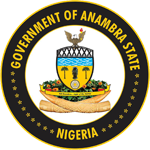The natural features of Hills, Lakes, Caves, Forests, and table Savannah landform the beautiful landscapes of Anambra State.
Situated on a rolling flat savannah land, dotted by Hills, Lakes, Forests, and caves on the eastern plains of the River Niger, Anambra State covers an area of 4,416sq kilometers with rainforest vegetation, humid climate, a temperature of about 87°F, and rainfall of between 152cm and 203cm. Anambra State shares boundaries with Abia, Delta, Enugu, Imo, and Kogi States making it one of the few states in the country with many neighbors.
With an estimated population of about 5,084,195 (2015 Census estimate), Anambra is the tenth most populous state in Nigeria.
Agriculture is important in the state: oil palm, corn, rice, yam, and cassava are its main cash crops. Fishing in inland waterways is a significant commercial activity.
The principal minerals found in the state are gypsum, kaolin, bauxite, iron ore, and lead. Anambra state also has natural gas and crude oil. Major industries include breweries, textiles, tourism, and soft drinks bottling. Locally produced sculptures of wood and metal are also of commercial importance.
